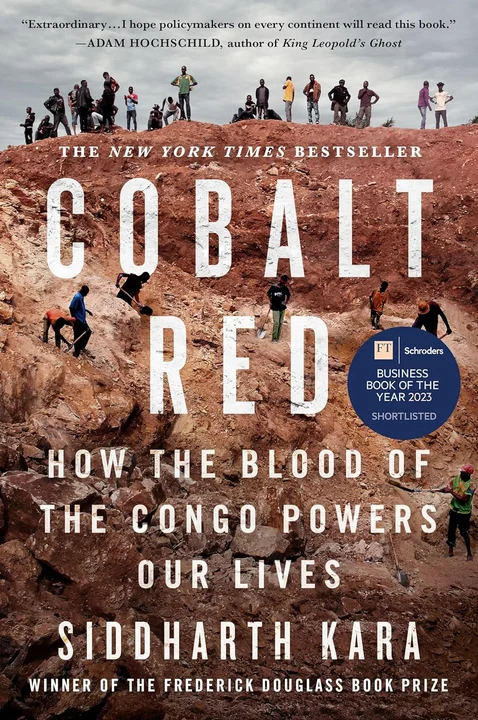
In the midst of the excitement surrounding the electric vehicle revolution, Siddharth Kara’s groundbreaking book, Cobalt Red: How the Blood of the Congo Powers Our Lives, offers a sobering exploration of the irrevocable human costs paid by those at the bottom of our global supply chains. Cobalt is a finite mineral used in lithium-ion batteries, making up over 50% of the batteries’ composition. These batteries fuel the rechargeable technologies now ubiquitous in our modern lives: laptops, smartphones, smart watches, tablets, e-bikes, and electric vehicles (EVs). Over 70% of the world’s cobalt supply is mined in the Democratic Republic of the Congo, where Kara traveled several times to conduct in-depth research between 2018 and 2021. Cobalt Red presents the author’s findings from this research, painting a horrifying picture of an industry powered by immense suffering, child labor, and undeniable exploitation.
The working conditions described in Cobalt Red are nothing short of heinous. The work itself is physically strenuous and dangerous. Men climb down into tunnels built in the ground to mine ore with rebar then haul it back in sacks. Children haul the sacks to nearby ponds and lakes, where women and girls bend over to clean the rock in the water, often with children strapped to their backs. Cobalt is toxic to breathe and touch, so many of the mine workers and their children develop serious health issues from the exposure. They make such little money that they often can’t afford medical treatment. Women and girls working in the mines are frequently victims of sexual violence. Accidents in the mines are all too common.
In addition to the grave human cost of cobalt mining, this industry is also destroying the natural environment of the Congo. Rainforest is destroyed, rivers and lakes are contaminated, and the air around the mines hangs heavy with dust and pollutants. While the shift toward EVs may be a net positive in our collective fight against climate change, Cobalt Red highlights the reality that climate change does not affect all people evenly, nor do our solutions to combat climate change. While switching the EVs may still be the right thing for the future of our planet, this cannot be a justification for the horrors described in this book. Solving the climate crisis cannot come at the expense of people compelled into inhumane working conditions because they have no other option to provide for their families. This is injustice.
Cobalt Red is rigorously researched and fairly well written, if unnecessarily poetic at times. Kara does an excellent job of situating contemporary cobalt mining within a larger history of resource exploitation and colonization in the Congo. Most striking in the book, however, are the intimate and personal stories of people touched by the horrors of the mining industry. Perhaps most impressive is Kara’s ability to build trust with these people despite their fear of retaliation from the militias who control the mining areas. The book would be nothing without the brave voices of the individuals willing to share their stories.
In mapping out the cobalt industry, Kara unequivocally indicts the companies at the very top of the supply chain, companies with which everyday readers are familiar and whose products they probably own. Apple, Tesla, Microsoft, BMW. All of these companies buy refined cobalt from Chinese companies that own and operate the mines. There is such little transparency within China that there is truly no way for any of these companies to determine with certainty whether their cobalt was mined by children or workers making less than a dollar per day. Cobalt Red lays out this reality in irrefutable terms, calling on consumers to demand more transparency and commitment to human rights from the very companies claiming to be socially responsible.
 Skip to main content
Skip to main content


